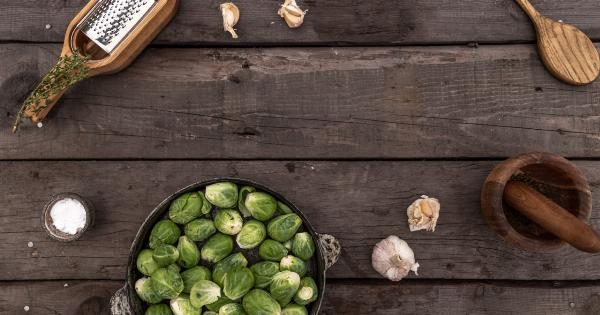Brussels sprouts are a type of cruciferous vegetable that has been gaining popularity in recent years due to their high nutritional value.
However, what many people do not know is that Brussels sprouts can also be an excellent natural remedy for promoting fertility in both men and women. In this article, we will explore the many benefits of Brussels sprouts for fertility and why they should be included in your diet if you are looking to conceive.
What are Brussels Sprouts?
Brussels sprouts are small, leafy vegetables that belong to the Brassicaceae family. They are similar in appearance to small cabbages and grow in tight clusters on a stalk.
The Brussels sprouts plant is believed to have originated in Belgium during the 16th century, hence its name. Today, Brussels sprouts are grown all over the world, with the majority coming from countries such as the United States, Canada, and the Netherlands.
The Nutritional Value of Brussels Sprouts
Brussels sprouts are packed with nutrients that are essential for overall health and wellbeing. They are a rich source of vitamins C, K, and A, as well as folate and dietary fiber.
They also contain a variety of minerals such as potassium, calcium, and iron. Brussels sprouts are also low in calories, making them an excellent addition to any weight loss diet.
How Brussels Sprouts Affect Fertility
Brussels sprouts contain several compounds that have been shown to have a positive effect on fertility. For example, they are rich in folic acid, which is essential for healthy fetal development.
Folic acid has been shown to reduce the risk of birth defects such as spina bifida and cleft palate, and it also plays a vital role in the production of healthy sperm and eggs.
Brussels sprouts are also rich in antioxidants, which help to reduce inflammation in the body. Inflammation has been linked to a variety of reproductive issues such as endometriosis and polycystic ovary syndrome (PCOS).
By reducing inflammation, Brussels sprouts can help to improve overall reproductive health and increase the chances of conceiving.
Brussels sprouts are also a good source of phytoestrogens, which are compounds found in plants that mimic the effects of estrogen in the body. This is important because estrogen plays a key role in female reproductive health.
It helps to regulate the menstrual cycle, promote healthy ovulation, and support the growth and development of the uterine lining. By consuming foods that are rich in phytoestrogens, such as Brussels sprouts, women can help to maintain healthy levels of estrogen in the body.
Other Health Benefits of Brussels Sprouts
In addition to promoting fertility, Brussels sprouts offer a range of other health benefits. For example, they have been shown to reduce the risk of several chronic diseases such as cancer, heart disease, and diabetes.
They are also a good source of fiber, which helps to promote healthy digestion and reduce the risk of digestive issues such as constipation and irritable bowel syndrome (IBS).
How to Incorporate Brussels Sprouts into Your Diet
There are many ways to incorporate Brussels sprouts into your diet, whether fresh, frozen, or canned. They can be roasted, steamed, or sautéed and make an excellent side dish for a variety of meals.
You can also add Brussels sprouts to salads or soups for an extra boost of nutrients. Here is a simple recipe for roasted Brussels sprouts:.
Roasted Brussels Sprouts Recipe
Ingredients:.
- 1 pound Brussels sprouts, trimmed and halved
- 2 tablespoons olive oil
- 1 teaspoon salt
- 1/2 teaspoon black pepper
Instructions:.
- Preheat your oven to 400°F.
- In a large bowl, toss the Brussels sprouts with olive oil, salt, and pepper.
- Spread the Brussels sprouts in a single layer on a baking sheet.
- Bake for 20-25 minutes, until the sprouts are tender and lightly browned.
- Remove from the oven and serve immediately.
Conclusion
Brussels sprouts are a delicious and nutritious vegetable that can offer numerous health benefits, including promoting fertility.
By incorporating Brussels sprouts into your diet, you can increase your chances of conceiving while also enjoying a range of other health benefits.




























